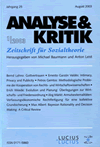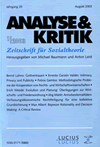Suchergebnisse
"Russell Keat"
Titel: Anti-Perfectionism, Market Economies and the Right to Meaningful Work
Autor: Russell Keat
Seite: 121-138
Abstract: Should perfectionist ideals of meaningful work play a significant part in the design of economic systems? In an influential article (Meaningful Work and Market Socialism), Richard Arneson rejected this traditional socialist view. Instead, he maintained, it should be left to the market, as a system that is consistent with the principle of neutrality, to determine the extent to which such work is available, and socialists should restrict their normative concerns primarily to issues of distributive justice. Against this it is argued here that market economies appear to be neutral only if understood in neo-classical, rather than institutionalist terms. From the latter perspective, market economies can be shown to take a number of institutionally distinct forms, which differ significantly in how far they favour the satisfaction of preferences for meaningful work. Collective choices between these alternative systems should take account of these differences, and the adoption of market economies does not avoid the need for perfectionist judgments in politics.
Titel: Meaningful Work and Market Socialism Revisited
Autor: Richard J. Arneson
Seite: 139-151
Abstract: If the economy consisted of labor-managed firms, so the workplace is democratic, and in addition the benefits and burdens of economic cooperation were shared equitably and the economy operated efficiently, might there still be a morally compelling case for further intervention into economic arrangements so as to increase the degree to which people gain meaningful or satisfying work? ’No!’, answers a 1987 essay by the author. This comment argues against that judgment, on the ground that morally required perfectionism or paternalism or simple fairness to the worse off might demand such intervention. It is plausible to hold the good life includes meaningful work, and that what we fundamentally owe one another is a fair distribution of good quality of life. However, this comment also takes issue with Russell Keats’s argument against Arneson in his essay in this issue of this journal.
Titel: Reply to Arneson
Autor: Russell Keat
Seite: 153-157
Abstract: Arneson says that he disagrees both with the main claims of Arneson (1987) and with my criticisms of these in Keat (2009). What is arguably the most important of the former disagreements is left until the final paragraphs, where he declares that he (now) rejects the principle of state neutrality and that we are comrades in believing that good perfectionist arguments for the promotion of meaningful work can be constructed (and may legitimately provide a basis for state action). I am more than happy to be counted a comrade in this respect. But otherwise I disagree with much of what he says in his response: I not only continue to support the criticisms I made in Keat (2009), but also disagree with another of Arneson’s main criticisms of Arneson (1987). So I shall both defend myself from his objections, and defend Arneson from his own.
Titel: Social Criticism and the Exclusion of Ethics
Autor: Russell Keat
Seite: 291-315
Abstract: As Axel Honneth has recently noted, the critical concerns of social philosophers during the past three decades have been focused primarily on questions of justice, with ethical issues about the human good being largely excluded. In the first section I briefly explore this exclusion in both ’Anglo-American’ political philosophy and ’German’ critical theory. I then argue, in the main sections, that despite this commitment to their exclusion, distinctively ethical concepts and ideals can be identified both in Rawls’s Theory of Justice and in Habermas’s Theory of Communicative Action, taking these as exemplary, representative texts for each theoretical school. These ethical elements, and their implications for the critical evaluation of economic institutions, have gone largely unnoticed. In the final section I indicate the kinds of debates that might be generated, were these to be given the attention they arguably deserve. I focus especially on the significance of empirical issues, and hence on the role of social science in social criticism.
Titel: Ethics, Markets and MacIntyre
Autor: Russell Keat
Seite: 243-257
Abstract: MacIntyre’s theory of practices, institutions, and their respective kinds of goods, has revived and enriched the ethical critique of market economies, and his view of politics as centrally concerned with common goods and human flourishing presents a ma jor challenge to neutralist liberal theorists’ attempts to exclude distinctively ethical considerations from political deliberation. However, the rejection of neutrality does not entail the rejection of liberalism tout court : questions of human flourishing may be accorded a legitimate role in political decisions including those about economic systems - provided that the powers of the state remain sub ject to certain recognizably liberal constraints. Further, although neutralist liberals often defend market economies on the mistaken grounds that they alone are consistent with the principle of ethical neutrality, a non-neutralist defence of them should not be ruled out, especially if the substantive theory of goods used to evaluate them is somewhat less restrictive than MacIntyre’s.

Work and Social Justice
2009 (31) Heft 1
Guest-Editor: Carsten Köllmann
Editorial
The labour market is among the most contested fields of political argument and conflict in our time. Public criticism of increasing wage inequalities and especially of excessive management pay is, notwithstanding its popularity, only a symptom of more fundamental changes going on in the labour market and in society at large. The conditions and the very meaning of work rank high on the agenda of Western societies. Persistent mass unemployment, coupled with an increasing number of working poor, co...

Revolutionary Aristotelianism: Ethics,Resistance and Utopia
2008 (30) Heft 1
Guest-Editors: Kelvin Knight / Paul Blackledge
Editorial
This special issue is composed of revisions of papers originally presented at a conference on Alasdair MacIntyre’s Revolutionary Aristotelianism: Ethics, Resistance and Utopia, hosted by the Human Rights and Social Justice Research Institute at London Metropolitan University from 29th June to 1st July 2007. In publishing them, Analyse & Kritik demonstrates a continuing interest in MacIntyre’s work which began with an important symposium on After Virtue in 1984, 6(1). Now republished in a thi...